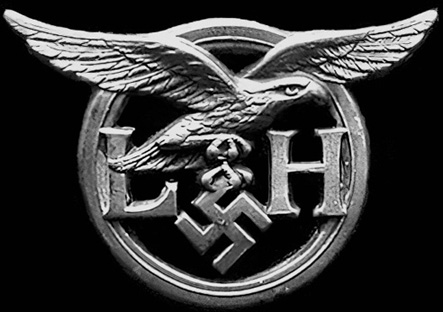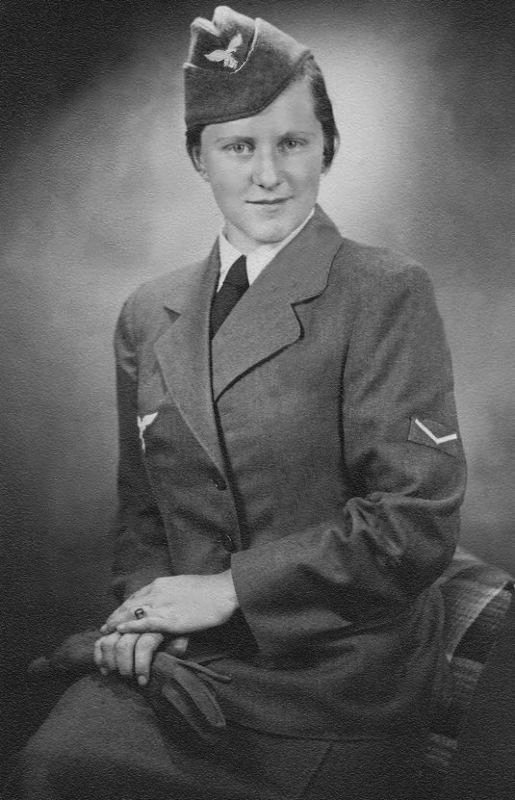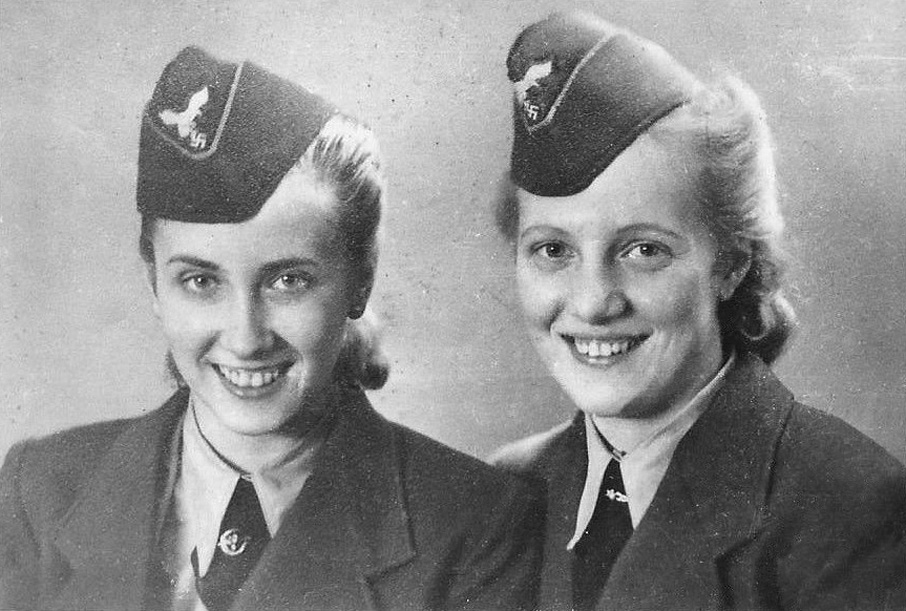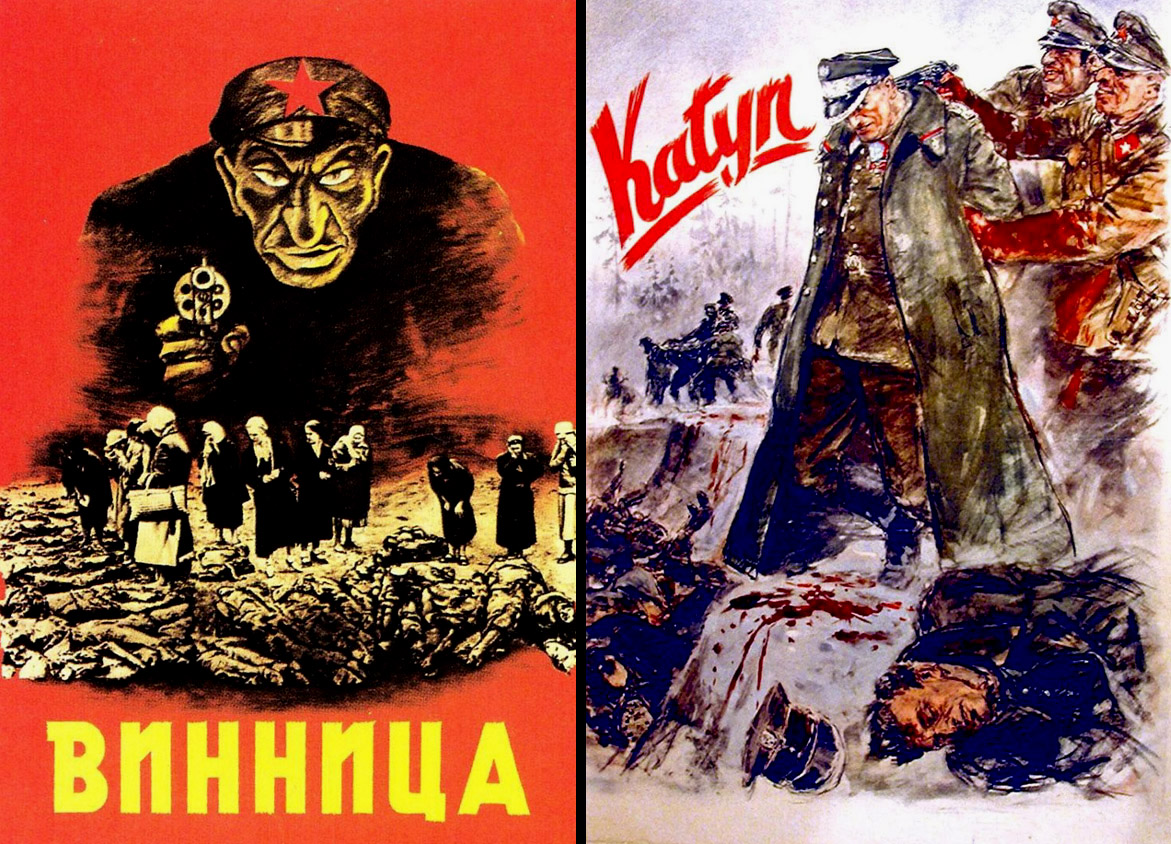

Interview with Elisabeth Lubes, Luftwaffehelferin (signals and plane spotter). Regensburg, 1999.
[Above: Luftwaffehelferin.]



Interview with Elisabeth Lubes, Luftwaffehelferin (signals and plane spotter). Regensburg, 1999.
[Above: Luftwaffehelferin.]

Elisabeth: Absolutely, I was right out of school in 1940 and wanted to do something for the war effort. Many of my neighborhood friends had gone on to RAD [Reichsarbeitsdienst, or Reich Labor Service] service, careers, or the military. I did my land year in the BDM [Bund Deutscher Mädel, or The League of German Girls)] in the east, helping Polish farmers with the spring planting.
Although we Germans did not want to be at war, at least if we had to, it seemed to be going well. I was worried when the British started to bomb the western parts of Germany. The news spoke of the first civilian deaths from bombs, it made us all uneasy. I had a good friend who worked at a plane factory in Regensburg and she said they were producing more fighters to combat the bombers.
In the east it was very peaceful, the Polish Army was beaten, and the people accepted the peace well. Considering Poland was largely responsible for the war, it seemed our peace terms with them were very lenient. Germany recovered lost lands and the civilians were safe.
The area my BDM troop was in was close to Poznan [a city on the River Warta in west-central Poland], and the families were very friendly to us. During this time I was looking at a newspaper that had an ad for Luftwaffe helpers with good pay. When my time was done I went to volunteer for signals helpers. I was accepted after a physical and screening and sent to school to learn the trade.
You mentioned you were on the east front, what was that like?
Elisabeth: Well I was not a fighter, not at all. When I was finished with school and earned my badge I was assigned to the Luftwaffe air defense zone and sent by train to Lemberg [now known as Lviv, in western Ukraine] in the east. It was in October 1941 I believe; the town was recently liberated in June. I remember there was much destruction; the Russians burned most all buildings before they retreated.
The city smelled of smoke and filth when we arrived. We received training you might like to know. They warned us of the gangs of Jews who were running around killing Germans and anyone helping us. The soldier said when they were caught they shot them, but many hid among the people. This scared us ladies, and we sought to be by soldiers when we got off the train.
The first thing I saw when walking around the city center was armed Jews with armbands. We were told they were on our side and protecting the city from criminals within their ranks. They seemed friendly, but had hard looks on their faces. They would stop other Jews and ask for their ID cards, it appeared.
There were many Jews in the city selling wares to the soldiers passing through. I ended up getting comfortable with them, and later bought a very nice bracelet to wear on my ankle. We didn't stay here for very long however as the front was advancing rapidly and we discovered the Russian air force was destroyed so there were no air attacks in our zone.
We ended up being moved up north to Minsk, which for us young girls was somewhat exciting, we were moving closer to the fighting. This today seems quite foolish. We received spy and partisan training to teach us how to watch out for them as we were told they had been active around this area. We could not go out into the country unless escorted by armed soldiers.
We were told earlier in October of '41 German Red Cross nurses along with soldiers had been ambushed and all killed by Jewish partisans in a most dreadful way.
Some of the partisans had been young women; one was hung for attacking an ambulance. They told us to not befriend any Russians who try to lure us out of the city. This city was recently liberated so it was just starting to get back to normal. Again there was evidence of Stalin's scorched-earth, I saw RAD units rebuilding along with civilians being used as well.
The SS was there also, they were the police and security men, I saw them make some Jews clear away rubble. They seemed happy to do this, but I am sure they were not. A trait common to the Jews was a hatred of manual labor; their areas of the cities were always the dirtiest. Many of the civilians seemed to not like them and made insults to them while working. I would see this while taking walks or lunches.

[Above: Two Luftwaffehelferinnen.]
How did the Russian people seem to be treated?
Elisabeth: From what I saw they were treated well, there seemed to be an air of gladness that Germany had freed them. Except for military barracks or installations you did not see many men in uniform. There were restaurants open again, street fairs, and bazaars to buy stuff. Except for the burned buildings you would not know there was war going on.
There were a lot of advertisements for people to come to the Reich to work, so it is not true people were forced.
I met many Minsk ladies who spoke German and asked about how home was. We shared dress designs and one was quite a seamstress who made me a nice going out dress. I was single and there were nightclubs you could go to and mingle with soldiers on leave. I will tell you many of our soldiers liked the look of the Ukrainian girls who had come to the city to work. They saw something in them I did not see. German girls were always the best in my humble eyes.
I can say too that the government treated them very well, extra food was diverted in until more could be produced, trains would bring all sorts of Polish and German wares for the people. It was handed out with rationing so one could not hoard. We met many Russians who fled the war and were settling in the city, the Red Cross helped them with food and shelter. A tent city was made for them, but when it turned really cold they had to be moved into buildings. That winter of 1941 was very cold.
There were also wounded soldiers who came to the hospital, I met one who was in a Luftwaffe flak regiment and was wounded by a bomb splinter. He spoke of the fast advances the Wehrmacht was having, and how they were cheered by the many people who thanked them for freeing the land.
Today the Reds say Germany killed and enslaved the civilian population, but that is a lie. I saw a people who seemed to come out of a bad dream when we saved them. Some were still very fearful of agents of the Soviets sneaking into areas and killing people. It was through talking to the Russians I met that I understood our war against Stalin was a war to free people from an evil system.
The only people I truly saw who it appeared to be bothered were the Jews, and they were singled out as they had such a hand in the creation of and conquest by Bolshevism. The people really seemed to have a hatred of the Jews, and I understand that when the Bolsheviks retreated, many Jews died in pogroms before German forces stopped it and restored order. That is why so many Jews became friendly to us, they were grateful Germans halted the killings.
It was only due to the Jewish terror squads and the anger of the native people that they were later forced into ghettos or camps so they could be watched. All I saw, although I was not everywhere, was good treatment of the Russian people. I was there and it is what I saw, I will never believe they were mistreated simply because the Soviets say so today.
Did you hear of any attacks on other female helpers?
Elisabeth: Yes, sadly later on in the war the enemy sent people behind the lines to find and organize Jews and fellow Bolsheviks who then waged war on the rear areas and civilians. A friend of mine from Berlin was lost in 1943. She was on her way to France for new duties and her bus was ambushed by partisans who shot her.
This is why such harsh measures were taken against these people; they gave no mercy and received none.
I had been moved to a Luftwaffe district for an air corps, and was to send out relays from the main district to sub districts in relation to flight operations. I now worked closely with men. Security was very tight as they told us other girls had been attacked by partisans or criminals. One girl in my unit was out walking in the park one night and was attacked by men who stole her purse and beat her. In broken German they called her a Nazi witch.
A witness followed them and turned them in, they were all Jews. The police arrested them and they were sent to a camp.
I remember our commander wanted them shot for attacking German military personnel, but the SS police said they were not allowed and they had to go to a camp to serve work sentences.
I also heard from some police that there had been crimes committed in Vinnitsa, Katyn and other places where the Bolsheviks killed prisoners and soldiers, including German nurses.
I was lucky I did not see any attacks; but we were made to be aware of them. As I mentioned sometimes we had to travel with soldiers to be safe. I am sure there were more but we never heard about them. From speaking with people after the war they said several hundred German girls died in the east due to killings, attacks, or accidents.
It is a small number compared to our numbers, but still, it shows the evilness of those who fought Germany, and then how they hide their crimes and make up false crimes against us. I have come to not believe anything they say today.

[Above: German/Ukrainian 1943 "Vinnitsa" poster (left) and 1943 German/Polish poster showing a Polish officer being murdered in the Katyn Forest.]
The Vinnytsia Massacre was the mass murder of between 9,000 and 11,000 innocent civilians in the town of Vinnytsia, Ukraine by Soviet communists. The majority of those murdered were shot in the back of the neck, most of them shot twice, but almost one hundred were shot three times. Almost four hundred of them also showed signs of being violently beaten, with their skulls smashed in. The men almost always had their hands tied behind their backs. Old women still wore clothes, while young women were found naked, no doubt raped and worse. The experts exhuming stopped digging after nearly 100 mass graves were found in three locations. There is believed to be many more bodies buried.
Then there is the Katyn Forest Massacre, like the Vinnytsia Massacre, the Germans found these horrific sites after liberating the countries from communist occupation. They immediately called in international, neutral teams of experts to supervise the sites. In Katyn Forest they found the murdered bodies of nearly 22,000 Polish military officers and intelligentsia. The communist calling card: Death.]
What was it like for you at war's end? You mentioned the Allies kept you as a prisoner for awhile.
Elisabeth: Yes, when ground was lost in the east we were evacuated and since the bombing was getting bad we were needed for national air defense. We were selected to go to Berlin for additional training in early 1944. I was shocked to see the city, it had been heavily bombed. I stayed in a compound outside the city, directing fighters to enemy bomber formations.
I did this all of 1944 until March of 1945. The enemy had broken the front and was on the doorstep. We were assembled by our leader who was very frank, he said the situation was dire, and the war was not going well. He said we were about to be surrounded and air defense would be cut off.
We were told we could stay in Berlin to help in the defense or evacuate north to Kiel to offer services to the new defenses. All of us, down to the last person wanted to leave Berlin, the city was a funeral, and we did not want to be trapped. We were told we would have to walk a lot so be prepared.
It was bitterly cold, but we started off on a bus that was crammed full. It took us out of the city in the evening and had to maneuver around the masses of refugees, many from eastern Europe. I saw them camping along the roadway, which was madness with how cold it was. We only made it maybe 50km outside Berlin when a bridge had been blown and we had to walk across a makeshift wooden plank.
Our trek was slow and painful; we saw Allied planes strafe the column in front of us, killing a good number of civilians. I even saw camp inmates who had been shot, maybe 13 or more. We wondered if the pilot knew who they were killing. It was early or mid April when we were in a small town by Wittingen, it was now warm and peaceful, the war seemed to have left us for a moment.
We were told the war was almost over, and there was no sense in continuing as too many roads, bridges, and rails had been destroyed, food was a real problem. Luckily many farmers were prepared and had milk and eggs to give out. It was towards the end of April when American soldiers came and seized the town. They took us away as we wore uniforms. We had some nurses with us, who were taken to go work with refugees.
We were herded onto trucks and told we were going to be processed for release, this made us feel good.
The Americans seemed to behave very well; they offered food, water and medical care. These were the front line soldiers. The rear soldiers were many former German Jews, and Poles who were very unkind. We were sent to a camp near Rudesheim on the Rhine. It was cold and wet, we had no shelter, when we protested we were told to shut up, the nice ones said we would not be here long.
They kept us here for three months, from April until July 1945. Some women became so sick they died. It was a wire enclosed camp with no shelter at first, when we had to do our business it was out in the open, many girls would take turns holding up coats so no one could see. The soldiers often whistled and called out when we did not have cover. This surprised me that an army would allow this to happen, especially to women who really had no part in fighting them.
There are rumors that many thousands of people died during the wet spring in these camps. Food was very scarce; there was no medical care, and no sanitary measures. When we had our monthly time, it just had to come and run down our legs, it was awful. I cannot describe the smell of the camp, urine and feces pits, which rain made worse. We slept at first in the open and in the rain. It was a crime they did this to us, while they had tents and buildings to stay in. Finally as it warmed up they started processing us to go home. It left a deep scar on me to have to witness this. But today we have been made to feel ashamed for what our government did, what hypocrites.

[Above: Klara Verstl, 21 years old, who died due to a 'tragic misfortune' on Valentine's Day, 1943.]
Back to Interviews